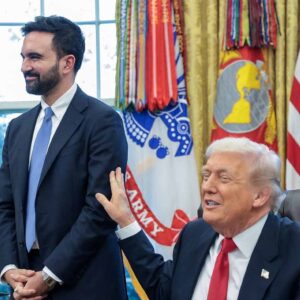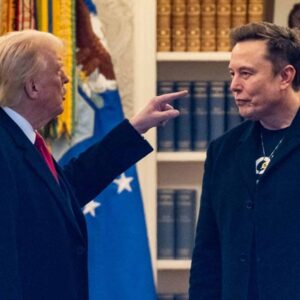THE PHOTOGRAPH LOOKS LIKE A glitch in the simulation.
Donald Trump in the Oval Office, grinning behind the Resolute Desk. Zohran Mamdani, democratic socialist, son of immigrants, mayor-elect of New York City, standing at his shoulder like a favourite nephew. The president’s hand reaches out in that familiar half-pat, signalling approval, possession, or both.
A few weeks earlier, Trump had been calling Mamdani “my little communist mayor” and threatening to starve New York of funds if the city dared to elect him. Mamdani, for his part, had campaigned on dismantling the very structures that made Trump’s rise possible. On paper, these men should be oil and water. On camera, they played as an odd double act.
The question is not whether they agree on policy. They do not. The more interesting question is why Trump clearly likes Mamdani. Why did a man who built his career on demonising New York liberals suddenly decide this particular New York liberal is “impressive” and “can do a very good job”?

The answer starts long before Mamdani, before the Oval Office, before Truth Social. It begins in Manhattan restaurants in the 1970s, in the company of a lawyer whose name still hangs over Trump like a spectre: Roy Cohn.
Roy Cohn was more than Trump’s attorney. He was the blueprint for a certain way of being powerful. Cohn had helped prosecute Ethel and Julius Rosenberg, whispered in Joe McCarthy’s ear, and reinvented himself as a fixer who could make problems disappear and enemies suffer. He talked softly, dressed sharply, and radiated an almost theatrical fearlessness.
From Cohn, Trump learned the famous three rules: never admit, never apologise, always counter-attack. But those were just tactics. The deeper lesson was aesthetic. Cohn taught Trump that charisma is a weapon, that a man who can dominate a room with charm and menace has an advantage before anyone looks at the facts.
In Cohn’s world, you were either a killer or a sucker. Killers were not defined by ideology but by how they carried themselves under fire. They smiled in court corridors, flirted with reporters, made outrageous claims without blinking. They understood that power is as much about performance as it is about law.
Trump absorbed that worldview completely. Decades later, you can still see Cohn’s fingerprint in the way he evaluates people. He is uninterested in quiet competence. He is fascinated by spectacle. He likes people who understand the camera, who can turn a hostile question into a punchline, who never look like they are begging for approval even when they are.
Seen through that lens, Zohran Mamdani is not a puzzle. He is an obvious object of interest. Mamdani did something Trump respects above almost anything else: he won a race he was supposed to lose. He took on an ex-governor, Andrew Cuomo, and the remnants of an old machine, and beat them with an unapologetically radical platform.
Trump has always forgiven ideology in the presence of victory. He called Kim Jong Un “my friend” once Kim proved he could survive internal coups and sanctions. He has embraced princes, strongmen and rivals who show they can endure pressure and still smile for the cameras. He likes winners. But he especially likes winners who turn their win into good television.
“Trump has always forgiven ideology in the presence of victory.”
Mamdani does that. He is tall, well-dressed, confident, the sort of politician who looks as comfortable on a picket line as in a boardroom. He speaks in full paragraphs, but he also understands timing. He can do the Election Night fire-breathing, then pivot, in the weeks after, into calm, composed meetings with donors and civil servants. That mix of edge and poise is exactly the balance Trump learned to admire in Cohn.
Then there is the Queens factor. Both Trump and Mamdani are Queens men, products of a borough that has long felt looked down on by Manhattan. Their politics could not be more different, but they share a certain chip on the shoulder about establishment snobbery. Trump dislikes “the elites” of his own city. Mamdani campaigned against those same elite networks from the left. They hate different things, but they hate the same people.
When they stood together in the Oval Office and Trump joked, “You could just say yes” when asked if Mamdani thinks he is a fascist, it sounded almost like family banter. Trump was doing what he always does with people he respects: folding the insult into the show. “Call me a fascist if you like,” the line implied. “Just do it in my theatre, on my terms.”
“You do not need a policy spreadsheet to understand why Trump warms to some enemies and not others; you need to watch who he reaches out to pat on the arm.”
Mamdani passed another, more subtle test in that moment. He did not take the bait. He did not grandstand, did not deliver a viral line at Trump’s expense, did not try to “own” him on live television. He smiled, let the president have the joke, and moved on. For the left, that restraint might look like timidity. For Trump, it looks like someone who understands the rules of the stage.
This is where Roy Cohn’s ghost really enters. Cohn prized people who could sit across from a hostile judge or journalist and maintain their composure. Panic, for Cohn, was the mark of a loser. In the Oval Office, Mamdani stayed uncowed. He did not look like a supplicant. He looked like a man who believed he belonged in the room. That alone earns a kind of grudging respect.
Compare that, now, to Trump’s long, jagged dance with Elon Musk. On paper, Musk is exactly the kind of figure Trump might admire: fabulously wealthy, a household name, associated with big projects and larger-than-life ambition. Yet their relationship has repeatedly curdled into rivalry and insult.

The problem, for Trump, is that Musk fails the Roy Cohn test. Musk has many gifts, but old-fashioned room charisma is not one of them. He is a creature of streams and timelines, more fluent in engineering diagrams than in the theatre of a press conference. His aura is built on genius and disruption, not on charm.
Trump does not measure men in IQ points; he measures them in applause. Musk can fill an auditorium, but there is something glitchy in his public persona: laughing at the wrong moments, monologuing into the mic, veering from deadpan to sarcasm with no clear line. He is fascinating, but he is not particularly smooth.
More important, Musk does not flatter Trump. He does not play the apprentice. He drops in and out of Trump’s orbit on his own schedule, criticises him openly, backs opponents, and talks as if the future belongs to rockets and AI, not to border walls and trade deals. He acts like a peer competing for narrative control, not a character in Trump’s story.
“Mamdani passes the Roy Cohn test because he understands that power is often a matter of scenes.”
That is unforgivable in Trump’s emotional universe. Trump can share the stage with a strongman or a socialist if they ultimately leave him as the central figure in the frame. He struggles with someone whose fame and wealth rival his own and who makes no effort to fold himself into Trump’s myth.
When Trump calls Musk a “bullshit artist,” there is projection in the insult. Both men are showmen, but they work in different mediums. Musk’s show increasingly happens online and in tech spaces that see themselves as post-political. Trump’s show requires the old ritual—the rally, the handshake, the crowd. Musk’s refusal to show deference in that space reads, to Trump, less like independence and more like disrespect.
Mamdani, by contrast, plays his part in the ritual flawlessly. He walks into the Oval Office, takes his place at Trump’s shoulder, listens, smiles, offers no cutting soundbites, and leaves with the image he needs: a young left-wing mayor standing calmly beside a Republican president who has, for the moment, chosen praise over threat. He gets what he wants without forcing Trump to lose face.
You could say that Mamdani passes the Roy Cohn test because he understands that power is often a matter of scenes. There will be time for confrontation later, in budgets and policies and city streets. The first encounter is about signalling that he is not afraid of the man across the desk, and not foolish enough to humiliate him gratuitously.
Trump responds to that instinctively. He may not trust Mamdani. He may despise his ideas. But he looks at him and sees someone who has mastered the grammar of the modern stage, who can talk to cameras and donors and tenants with apparent ease. In Trump’s eyes, that makes him “serious,” regardless of ideology.
The danger, history suggests, is that Trump’s affection is brittle. Chuck Schumer and Nancy Pelosi were once, briefly, described as clever deal-makers, the Democrats he could “work with.” They emerged from meetings boasting that they had outmanoeuvred him; the relationship never recovered. Praise, in Trump’s world, is a loan, not a grant.
If Mamdani laps up the Oval Office warmth too loudly, if he tells a story that casts Trump as the dupe who got rolled by a radical mayor from Queens, the admiration will curdle. The Roy Cohn test has a second half: can you be loyal to the story Trump is telling about himself, even when you disagree on everything else?
“The insult and the compliment are two sides of the same coin: both are acknowledgments that you matter enough to be written into his drama.”
For now, though, the photograph stands. Trump looks up, perhaps seeing in Mamdani a perverse echo of his younger self: the outer-borough kid who crashed the city’s party, the outsider who beat the machine, the man who proved the establishment wrong. The fact that Mamdani wants to use that victory to build rent control rather than tax cuts is a secondary detail.
If there is a quotable way to summarise it, it is this: Trump likes mirrors more than maps. He is less interested in where you want to take the country than in how you look standing next to him while you say it.
Roy Cohn taught him to sort the world into killers and suckers; charisma, charm and composure were the signs of a killer. Elon Musk, for all his billions, does not trigger that recognition. Zohran Mamdani, for now, does.
To understand why Trump blesses some enemies and feuds eternally with others, you do not need a policy spreadsheet. You need to watch the stage, listen for the laughter, and count how many times he reaches out, as he did with Mamdani, to deliver that small, performative pat on the arm that says: “You are in my show, and for the moment, I approve.”

